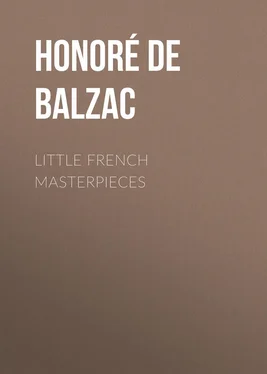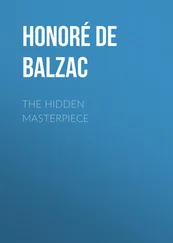Honoré Balzac - Little French Masterpieces
Здесь есть возможность читать онлайн «Honoré Balzac - Little French Masterpieces» — ознакомительный отрывок электронной книги совершенно бесплатно, а после прочтения отрывка купить полную версию. В некоторых случаях можно слушать аудио, скачать через торрент в формате fb2 и присутствует краткое содержание. Жанр: foreign_antique, foreign_prose, на английском языке. Описание произведения, (предисловие) а так же отзывы посетителей доступны на портале библиотеки ЛибКат.
- Название:Little French Masterpieces
- Автор:
- Жанр:
- Год:неизвестен
- ISBN:нет данных
- Рейтинг книги:5 / 5. Голосов: 1
-
Избранное:Добавить в избранное
- Отзывы:
-
Ваша оценка:
- 100
- 1
- 2
- 3
- 4
- 5
Little French Masterpieces: краткое содержание, описание и аннотация
Предлагаем к чтению аннотацию, описание, краткое содержание или предисловие (зависит от того, что написал сам автор книги «Little French Masterpieces»). Если вы не нашли необходимую информацию о книге — напишите в комментариях, мы постараемся отыскать её.
Little French Masterpieces — читать онлайн ознакомительный отрывок
Ниже представлен текст книги, разбитый по страницам. Система сохранения места последней прочитанной страницы, позволяет с удобством читать онлайн бесплатно книгу «Little French Masterpieces», без необходимости каждый раз заново искать на чём Вы остановились. Поставьте закладку, и сможете в любой момент перейти на страницу, на которой закончили чтение.
Интервал:
Закладка:
"But why, my dear master?" Porbus respectfully asked the old man, while the young man had difficulty in repressing a savage desire to strike him.
"Ah! it is this way," replied the little old man. "You have wavered irresolutely between the two systems, between drawing and colour, between the phlegmatic minuteness, the stiff precision of the old German masters, and the dazzling ardour and happy plenitude of the Italian painters. You have tried to imitate at the same time Hans Holbein and Titian, Albert Dürer and Paul Veronese. Assuredly that was a noble ambition! But what has happened? You have achieved neither the severe charm of precision, nor the deceitful magic of the chiaroscuro. In this spot, like melted bronze which bursts its too fragile mould, the rich, light colouring of Titian brings out too prominently the meagre outlines of Albert Dürer in which you moulded it. Elsewhere, the features have resisted and held in check the superb polish of the Venetian palette. Your face is neither perfectly drawn nor perfectly painted, and bears everywhere the traces of that unfortunate indecision. If you did not feel strong enough to melt together in the flame of your genius the two rival systems, you should have chosen frankly one or the other, in order to obtain the unity which represents one of the conditions of life. You are accurate only in the surroundings, your outlines are false, do not envelop each other, and give no promise of anything behind.
"There is a touch of truth here," said the old man, pointing to the saint's breast; "and here," he added, indicating the point where the shoulder came to an end. "But here," he said, reverting to the middle of the throat, "all is false. Let us not attempt to analyse anything; it would drive you to despair."
The old man seated himself on a stool, put his face in his hands, and said no more.
"Master," said Porbus, "I studied that throat very carefully in the nude figure; but, unfortunately for us, there are true effects in nature which seem improbable upon canvas."
"The mission of art is not to copy nature, but to express it! You are not a vile copyist, but a poet!" cried the old man, hastily interrupting Porbus with an imperious gesture. "Otherwise a sculptor would reach the end of his labours by moulding a woman! But try to mould your mistress's hand and to place it before you; you will find a horrible dead thing without any resemblance, and you will be obliged to resort to the chisel of the man who, without copying it exactly, will impart motion and life to it. We have to grasp the spirit, the soul, the physiognomy of things and of creatures. Effects! effects! why, they are the accidents of life and not life itself.
"A hand – as I have taken that example – a hand does not simply belong to the body; it expresses and carries out a thought, which you must grasp and represent. Neither the painter, nor the poet, nor the sculptor should separate the effect from the cause, for they are inseparably connected! The real struggle is there! Many painters triumph by instinct, without realising this axiom of art. You draw a woman, but you do not see her! That is not the way that one succeeds in forcing the secrets of nature. Your hand reproduces, without your knowledge, the model that you have copied at your master's studio. You do not go down sufficiently into the inmost details of form, you do not pursue it with enough enthusiasm and perseverance in its windings and its flights.
"Beauty is a stern and exacting thing which does not allow itself to be caught so easily; we must await its pleasure, watch for it, seize it, and embrace it closely, in order to compel it to surrender. Form is a Proteus much more difficult to seize and more fertile in evasions than the Proteus of fable; only after long struggles can one compel it to show itself in its real guise. You are content with the first aspect under which it appears to you, or at most with the second or third; that is not true of the victorious fighters! The invincible painters do not allow themselves to be deceived by all these subterfuges; they persevere until nature is reduced to the point where she must stand forth naked and in her real shape.
"That was the process adopted by Raphael," said the old man, removing his black velvet cap to express the respect inspired by the king of art; "his great superiority comes from the secret perception which, in him, seems determined to shatter form. In his figures form is what it really is in us, an interpreter for the communication of ideas and sensations, a vast poetic conception. Every figure is a world, a portrait, whose model has appeared in a sublime vision, tinged with light, indicated by an inward voice, disrobed by a divine figure, which points out the sources of expression in the past of a whole life. You give your women lovely robes of flesh, lovely draperies of hair; but where is the blood which engenders tranquillity or passion, and which causes special effects? Your saint is a dark woman, but this one, my poor Porbus, is a blonde! Your figures are pale, coloured spectres which you parade before our eyes, and you call that painting and art!
"Because you have made something which looks more like a woman than like a house, you think that you have attained your end; and, overjoyed because you no longer have to write beside your figures, currus venustus , or pulcher homo , like the first painters, you fancy that you are marvellous artists! Ah, no! you are not that yet, my good fellows; you will have to use up more pencils and cover many canvases before you reach that point! To be sure, a woman carries her head like that, she wears her skirts as this one does, her eyes languish and melt with that air of mild resignation, the quivering shadow of the eyelashes trembles thus upon her cheek! That is accurate and it is not accurate. What does it lack? A mere nothing, but that nothing is everything. You produce the appearance of life, but you do not express its overflow, that indefinable something which perhaps is the soul, and which floats cloud-like upon the outer envelope; in a word, that flower of life which Titian and Raphael discovered.
"Starting from the farthest point that you have reached, an excellent painting might perhaps be executed; but you grow weary too soon. The common herd admires, but the connoisseur smiles. O Mabuse, O my master," added this extraordinary individual, "you are a thief; you carried life away with you! – However," he continued, "this canvas is worth more than the painting of that mountebank of a Rubens, with his mountains of Flemish flesh powdered with vermillion, his waves of red hair, and his wilderness of colours. At all events, you have here colouring, drawing, and sentiment, the three essential parts of art."
"But that saint is sublime, my good man!" cried the young man, in a loud voice, emerging from a profound reverie. "Those two figures, of the saint and the boatman, have a delicacy of expression utterly unknown to the Italian painters; I don't know a single one of them who could have achieved the hesitation of the boatman."
"Does this little knave belong to you?" Porbus asked the old man.
"Alas! pray excuse my presumption, master," replied the neophyte, blushing. I am a stranger, a dauber by instinct, only lately arrived in this city, the source of all knowledge."
"To work!" said Porbus, handing him a pencil and a sheet of paper.
In a twinkling the stranger copied the Mary .
"O-ho!" cried the old man. "Your name?"
The young man wrote at the foot of the drawing: Nicolas Poussin .
"That is not bad for a beginner," said the strange creature who harangued so wildly. "I see that we can safely talk painting before you. I don't blame you for admiring Porbus's saint. It is a masterpiece for the world, and only those who are initiated in the most profound secrets of art can discover wherein it offends. But since you are worthy of the lesson and capable of understanding, I will show you how little is necessary to complete the work. Be all eyes and all attention; such an opportunity for instruction will never occur again perhaps. – Your palette, Porbus!"
Читать дальшеИнтервал:
Закладка:
Похожие книги на «Little French Masterpieces»
Представляем Вашему вниманию похожие книги на «Little French Masterpieces» списком для выбора. Мы отобрали схожую по названию и смыслу литературу в надежде предоставить читателям больше вариантов отыскать новые, интересные, ещё непрочитанные произведения.
Обсуждение, отзывы о книге «Little French Masterpieces» и просто собственные мнения читателей. Оставьте ваши комментарии, напишите, что Вы думаете о произведении, его смысле или главных героях. Укажите что конкретно понравилось, а что нет, и почему Вы так считаете.












